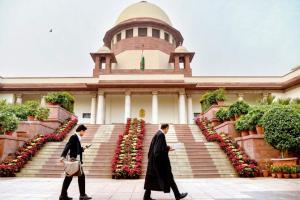The apex court said tracing the originator of a message or content on social media platforms is a "very serious issue" as it also involves terrorism, pornography, paedophilia, fake news and trolling

The SC said the Centre must step in and inform it within three weeks the time-frame needed for framing guidelines. File pic
New Delhi: Observing that technology has taken a "dangerous turn" and it hardly takes five minutes to purchase an AK-47 rifle on the 'dark web', the Supreme Court on Tuesday said the Centre must step in and inform it within 3 weeks the time-frame needed for framing guidelines to curb misuse of social media. At one stage during the hearing on a petition by popular social media platform Facebook, Justice Deepak Gupta, who was part of a two-judge bench, said the way things are going on he was even thinking of giving up his smartphone and go back to older ways.
ADVERTISEMENT
The apex court said tracing the originator of a message or content on social media platforms is a "very serious issue" as it also involves terrorism, pornography, paedophilia, fake news and trolling. Expressing serious concern over some social media platforms not being able to trace the originator of messages, the bench, which also included Aniruddha Bose, said the Centre must step in now. "It's a worldwide issue but it needs a answer. We are as much concerned as you are. It raises very serious issues as it involves national security, trolling, terrorism, fake news, pornography, paedophilia."
The court was hearing a petition filed by Facebook Inc seeking transfer of cases pending before various High Courts in the country which relates to linking of social media profiles with Aadhaar and tracing of the originator of online messages. Facebook has sought transfer of cases to the apex court saying it involves larger issues like that of privacy of an individual and any changes would affect its operation worldwide. Voicing concern over the unregulated online content, Justice Gupta said, "After the last hearing on the issue, with little help, I could have purchased an AK-47 in five minutes on the dark web. Technology has taken a dangerous turn and it's high time, that government comes out with some kind of guidelines". 'Dark web' refers to encrypted content on the internet, which cannot be accessed through conventional online search engines and is used mostly by hackers.
The bench said, "Nowadays, social media is used to peddle fake news and violence is incited. There have to be some guidelines as my privacy is also important. We think the Centre should come with some kind of policy framework to check all this. You cannot simply say that we don't have the technology. Why should someone be able to troll me and spread lies about my character? State can look after itself but what about the individual? What remedy is there?".
"We have to accept that there is a problem. You cannot simply say anything about anyone on social media and getaway. The originator of the message has to be traced and action needs to be taken against him. Why cannot a person approach the intermediary and say look this person has defamed me and I want to know who he is?". Solicitor General Tushar Mehta, appearing for the Centre said the issue was in active consideration but he has to take instructions, as how much time is needed to formulate a policy.
He concurred with the bench that the issue involves serious deliberation as fake news are bring spread in the social media, pictures are being morphed and violence are being incited by posting a picture from some other country. During the hearing, the bench said if an intermediary refuses to disclose the originator of messages, then the police has enough powers under the law to look into it. Senior advocates Mukul Rohatgi and Kapil Sibal, appearing for Facebook and Whatsapp, said that not all platform works on end-to-end encryption, where tracing of the originator is not possible.
Taking note of a statement made by Centre before the Madras High Court, the bench said the government has stated that the issue is under its active consideration and it will soon come up with a policy framework to curb social media misuse. The top court said that once centre formulates a policy framework to curb the misuse of social media, then it would see how it measures up to the law and the Constitution. At the outset, Attorney General K K Venugopal, appearing for Tamil Nadu government, said that the hearing before the Madras High Court was at an advanced stage and the proceedings could be allowed to go on.
"These companies have the inkling on which way the hearing was going and therefore they want transfer of the case from the high court to apex court," he claimed. Responding to Venugopal's argument, the bench said that it is a larger issue as it also involves the privacy of the individual and national security.
"Neither the apex court nor the high court is competent to decide this scientific issue and it is for the government to come up with appropriate guidelines to deal with these issues and ensure that privacy and sovereignty of the state is maintained," it said, adding there are several other reasons which needs to be ironed out. Venugopal said if these social media companies do not comply with Indian laws, then they should leave the country. The argument of Venugopal was opposed strongly by Rohatgi and Sibal, who said Tamil Nadu government cannot tell them to leave the country.
Catch up on all the latest Crime, National, International and Hatke news here. Also download the new mid-day Android and iOS apps to get latest updates
 Subscribe today by clicking the link and stay updated with the latest news!" Click here!
Subscribe today by clicking the link and stay updated with the latest news!" Click here!






